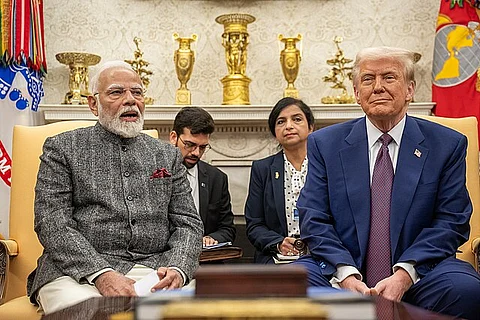

President Donald Trump launched a scathing attack on India Thursday, declaring, "I don't care what India does with Russia. They can take their dead economies down together, for all I care". Hours before the August 1 trade deal deadline, Trump finalized 25% tariffs on Indian goods plus an undisclosed penalty, significantly harsher than rates imposed on allies like the EU (15%) or Vietnam (20%). The penalty targets India’s "obnoxious" trade barriers, Russian oil/arms imports, and BRICS membership, which Trump called "anti-American".
India’s rupee plunged to a five-month low against the dollar, while stock indices fell 0.9% as economists warned the tariffs could slash GDP growth by 30–40 basis points. Critical export sectors, such as pharmaceuticals, textiles, and automotive face devastating blows, with Nomura predicting $7–9 billion in export losses. Despite India’s last-minute tariff cuts on bourbon and motorcycles, Trump dismissed concessions as insufficient, noting India’s agricultural tariffs remain as high as 50%.
Trump’s announcement included a taunting reference to a new U.S.-Pakistan oil pact, suggesting Islamabad might "sell oil to India someday". This followed Secretary of State Marco Rubio’s condemnation of India’s Russian oil imports as "funding Putin’s war machine". Opposition leader Rahul Gandhi blasted Prime Minister Modi’s "catastrophic foreign policy failure," citing diplomatic humiliation after years of public embraces with Trump.
The collapse stems from India’s refusal to open its agricultural sector, where U.S. demands threatened 40% of India’s workforce. White House adviser Kevin Hassett confirmed Trump’s frustration, stating the tariffs aim to force India to "reconsider its practices". Compounding tensions, Trump explicitly linked penalties to India’s BRICS membership, accusing the bloc of undermining the U.S. dollar.
Commerce Minister Piyush Goyal vowed to shield farmers and small businesses, calling the tariffs "unfortunate" but emphasizing India’s rise from "Fragile Five to top-five economy". Analysts note India’s options are limited; retaliatory tariffs could spark further escalation while domestic industries reel. With U.S. Treasury Secretary Scott Bessent warning, "The ball is in India’s court," prospects for a near-term deal appear bleak.